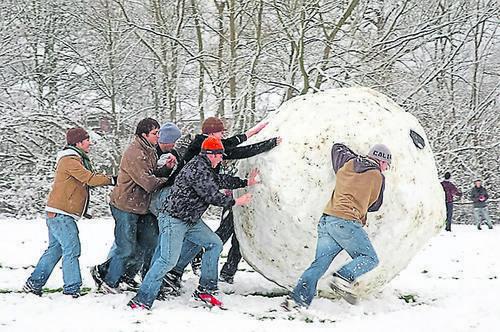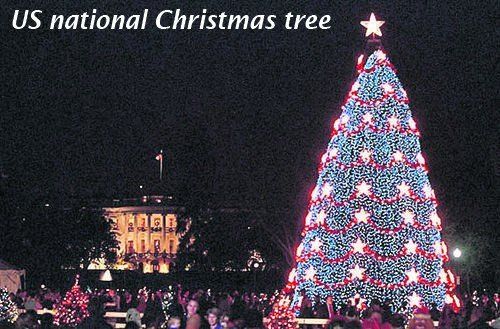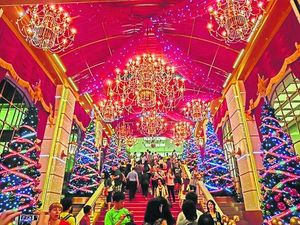Paul Mackrell encourages both Christians and non-Christians not to confuse true Christianity with the trappings of Christmas.
Annual national events seem to be getting bigger and bigger. More chocolate is now eaten at Easter than ever before. The mix of childish and sinister rituals that is Halloween grows with each succeeding year. And Remembrance Day is commemorated with far more diligence than a few decades back, when those the nation promised to remember could actually be remembered.
Much of this is driven by commercial interests, but there is also something within us which hankers for routine and structure in an uncertain and hectic world.
Giant snowball
All of these, and other, annual events pale into insignificance, of course, when stacked up against Christmas. When it comes to comparisons, Christmas is the giant sequoia towering high in a woodland of saplings.
Tracing the history of Christmas is like observing children roll a giant snowball downhill. The British model has developed and grown over the years without anything much ever dropping off.
The elements which made up a medieval Christmas are still discernible in any typical home or church service on 25 December. The singing of carols, the holly and mistletoe, the family gathering, the mince pies and Christmas pudding have not gone away. Whilst there may not be an actual Yule log in the fire grate, one of the Christmas cards on the mantle-piece is bound to portray one.
Any change in Christmas has therefore been in the scaling up of the festivities and in the addition of totally new elements. The snowball has become enormous and now incorporates many other newer and diverse constituent parts.

So, as well as the excessive eating and drinking alongside the exchange of presents and playing of games, you now have the Christmas tree, the children’s nativity play, Santa Claus and his reindeers, the pulling of crackers, the writing and sending of cards, the office party, the Christmas pantomime, Boxing Day football and so much else.
On top of all that, many families develop their own traditions. It is all a heady mix of a thousand-and-one different things that feel like they just have to be done or Christmas will not be Christmas. Add to that the inevitable strains on pocket and nerves of keeping everyone happy, it’s no wonder that increasing numbers of people are using the Christmas-New Year period to escape from it all.
American Christmas
The American history of Christmas is even more interesting. After a bitterly fought Civil War between north and south, inevitable strains developed between industrial and rural interests, as between descendants of the original settlers and the new immigrant communities, Christmas proved a brilliant way to unite the fledging country.
It brought people together and left no one outside. Each segment of the population could make their own unique contribution to Christmas, by bringing something of their homeland or past background and adding it to the general mix.
The religious dimension was a key element in this phenomenon. It meant that those from different denominational backgrounds could all be accommodated. In a sense, Christmas was the great celebration of ecumenicity, long before liberal-minded people had even heard the word ‘ecumenical’.

And so a brand new tradition surrounding Christmas was formed in America, compromising a potpourri of nostalgia and different traditions. It gave everyone a stake in the new country. The festival acknowledged all individuals by incorporating something of their particular past. It was the glue that held the country together until such times as it could forge an identity of its own.
Christmas is therefore what you make it. Christmas offers us a table laden with goodies of various descriptions and invites us to take from the table. You can walk away from the table altogether, as the Puritans in England once did, or make a series of entirely self-indulgent and immoral selections. Most people choose something in between.
Christians will invariably want to celebrate the birth of the Lord Jesus at Christmas and will take that from the table. They may, at the same time, take sensibly from some of the wholesome and welcome other things on offer. It is important to stress, however, that Christmas is not Christianity and Christianity is not Christmas.
Pick-and-mix
Many people treat Christianity in exactly the same way as they treat Christmas. To them it offers an array of teaching, experiences and traditions, from which they can select at will; it’s a kind of pick-and-mix religion, very private and highly personal.
It may comprise, for example, a decision from years ago, or a remarkable event in life interpreted as divine favour or protection, plus a heavy dose of superstitious spirituality and even a memorable verse or two of Scripture.
All of this is put together and sewn up with the unshakeable belief that, however I live (and I can more or less live as I please), God will always love me and be there for me.

People talk about their faith as seeing them through various trials in life. Some might actually mean that the Lord, in whom their faith is placed, has been their guide. But more often than not they refer, quite literally, to ‘their faith’ — that is, their individually composed collection of religious symbols, ideas and fancies. Such concoctions are a million miles from biblical Christianity.
True Christianity is God-given. It is a revealed body of truth that must be accepted in its entirety or not at all. It means embracing Jesus Christ, the Saviour of sinners, whose sin-bearing life and righteousness-bestowing grace can only be accepted in its fulness.
When ancient castles or monasteries were abandoned, local people would ransack the site to recycle the building material for use in their own homes. That is a picture of what many people are doing to historic Christianity.
The God-given biblical faith of past generations is being torn down and raided for different elements, which can be incorporated into a modern, individualised and entirely man-made building. Understandably, some of the stones are instantly recognisable, but look closer and you will find a new design, a new combination of materials and a building being put to an entirely different use.
Revealed truth
But authentic Christianity will always defend the Scriptures against those who pick and choose which bits of the Bible they think are worthy of belief and those which can be ‘safely’ discarded. The legitimate charge against such is that they create a ‘Bible’ of their own — a ‘Bible’ which cannot possibly speak with authority, because it’s a human construct.
The fact is, God has revealed himself in his Word. We are not free to add to or subtract from it. And historic, God-given Christianity must not be confused with what are essentially thousands of little, false and self-made religions.
So enjoy Christmas. Make sensible choices and use your Christian discretion and freedom responsibly. But let’s not think that we can hold ‘the faith once delivered to the saints’ in the same way that we treat Christmas.
Paul Mackrell grew up in Hampshire, but now lives in West Sussex with his wife, Sue, who comes from Liverpool. They have three daughters, two sons and ten grandchildren.



